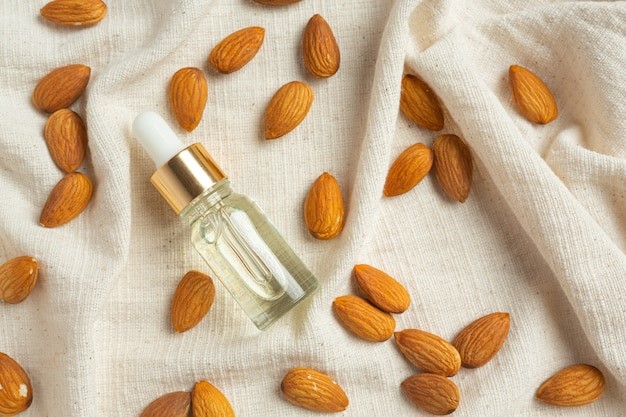Health Benefits and Uses of Almond Oil

Almond oil, also known as badam oil, is a natural oil derived from the kernels of the almond tree. This oil is rich in nutrients and has been used for centuries for its health benefits and uses.
What is almond oil?
Almond oil is a type of vegetable oil that is extracted from almonds. The oil is obtained by cold-pressing the almond kernels to extract the oil. Almond oil is known for its light, sweet scent, and moisturizing properties. It is a popular ingredient in many cosmetic and beauty products due to its high content of vitamin E and other nutrients.
Almond Oil Nutrition
Almond oil is a rich source of nutrients and beneficial compounds. It is a natural oil extracted from the kernels of the almond tree and is commonly used in cooking, skincare, and hair care products.
One tablespoon (15 ml) of almond oil provides approximately 120 calories, 14 grams of fat, and 0 grams of protein and carbohydrates. The fat in almond oil is mainly composed of monounsaturated and polyunsaturated fatty acids, which have been linked to various health benefits.
Almond oil is also a good source of vitamin E, which is a powerful antioxidant that helps to protect the body from oxidative stress. One tablespoon of almond oil contains approximately 7 mg of vitamin E, which is about 47% of the daily recommended intake.
In addition to vitamin E, almond oil contains other beneficial compounds, including phytosterols, which have been shown to help lower cholesterol levels, and polyphenols, which have anti-inflammatory and antioxidant properties.
Overall, almond oil is a nutrient-dense food that can provide many health benefits when consumed in moderation as part of a balanced diet. However, it is important to keep in mind that almond oil is high in calories and fat, so it should be used in moderation if you are trying to lose weight or manage your weight.
Health Benefits of Almond Oil
- Promotes skin health: Badam oil has emollient properties that help to moisturize and nourish the skin, making it a popular ingredient in skincare products. The fatty acids and antioxidants in almond oil also help to protect the skin from sun damage and premature aging [1, 2]. According to a study published in the Journal of Cosmetic Dermatology, almond oil can improve skin hydration and reduce skin roughness
- Strengthens hair: Almond oil is rich in vitamins and minerals that promote healthy hair growth and prevent hair loss. It also has a high content of omega-3 fatty acids, which help to strengthen hair follicles and prevent breakage [3, 4].
- Reduces inflammation: Almond oil contains polyphenols, which have anti-inflammatory properties. Studies have shown that consuming almond oil can help to reduce inflammation in the body and improve overall health [5, 6].
- Lowers cholesterol: The phytosterols in almond oil have been shown to help lower LDL (bad) cholesterol levels in the body. Consuming almond oil as part of a healthy diet can help to reduce the risk of heart disease [7, 8].
- Supports brain health: Almond oil is a rich source of vitamin E, which has been linked to improved cognitive function and a reduced risk of Alzheimer’s disease [9, 10].
Badam oil is a rich source of antioxidants, which are compounds that protect the body from free radical damage. Free radicals are unstable molecules that can damage cells and contribute to the development of chronic diseases such as cancer, diabetes, and heart disease. Antioxidants neutralize free radicals and prevent them from causing damage.
Protects against oxidative stress:
Almond oil contains high levels of vitamin E, which is a powerful antioxidant. Vitamin E helps to protect the body against oxidative stress, which occurs when there is an imbalance between free radicals and antioxidants in the body.
Reduces the risk of chronic diseases:
The antioxidants in almond oil have been shown to reduce the risk of chronic diseases such as cancer, diabetes, and heart disease. Studies have found that consuming almond oil can help to lower inflammation in the body, which is a key factor in the development of chronic diseases.
Supports healthy aging:
The antioxidants in almond oil can help to prevent age-related damage to the body, such as wrinkles, age spots, and cognitive decline. Studies have found that consuming almond oil can improve cognitive function and reduce the risk of Alzheimer’s disease.
Boosts immunity:
Almond oil contains antioxidants such as flavonoids and phenolic acids, which have immune-boosting properties. Consuming almond oil can help to strengthen the immune system and reduce the risk of infections and diseases.

Almond oil benefits: Might control blood sugar
It has been studied for its potential benefits in blood sugar control. Some of the benefits of almond oil include:
Lowers blood sugar levels: A study published in the Journal of Medicinal Food found that almond oil supplementation was associated with significant reductions in fasting blood glucose levels in rats with diabetes.
Improves insulin sensitivity: Almond oil has been found to increase insulin sensitivity in animal studies. Improved insulin sensitivity can help to better regulate blood sugar levels.
Contains healthy fats: Almond oil is high in monounsaturated and polyunsaturated fats, which have been shown to improve blood sugar control and reduce the risk of diabetes.
Supports heart health: Almond oil has been shown to have a positive impact on cardiovascular health by reducing LDL cholesterol levels and increasing HDL cholesterol levels.
Almond oil benefits in promoting weight loss…
May promote satiety: A study published in the European Journal of Clinical Nutrition found that consumption of almonds increased feelings of fullness and reduced hunger, leading to lower calorie intake overall.
Supports healthy metabolism: Almond oil contains healthy fats and vitamin E, which are important for maintaining a healthy metabolism. This can help the body to better regulate energy and burn calories more efficiently.
Can be used in cooking: Almond oil can be used as a substitute for other cooking oils, such as vegetable or canola oil. Using almond oil in cooking can help to reduce calorie intake and support weight loss efforts.
Almond Oil Beauty Benefits
Almond oil, also known as badam oil, is a versatile oil that can be used for a variety of beauty benefits. Some of the benefits of almond oil for beauty include:
- Moisturizes skin: Almond oil is a natural emollient and can help to moisturize and soften the skin. It can be applied directly to the skin or added to a moisturizer for added hydration.
- Reduces dark circles: The vitamin E in almond oil can help to reduce the appearance of dark circles under the eyes. Gently massaging almond oil under the eyes can help to improve circulation and reduce puffiness.
- Improves complexion: Almond oil can help to improve the complexion by reducing the appearance of acne scars and blemishes. It can also help to even out skin tone and reduce the appearance of fine lines and wrinkles.
- Strengthens hair: Almond oil can be used as a hair treatment to help strengthen and nourish hair. It can be used as a leave-in conditioner or added to shampoo to help reduce breakage and promote healthy hair growth.
- Soothes dry scalp: Almond oil can help to soothe and moisturize a dry scalp. Massaging almond oil into the scalp can help to improve circulation and reduce flakiness.
How to Use: Badam oil uses
Badam oil, also known as almond oil, can be used in various ways for its health and beauty benefits. Here are some ways to use badam oil:
- As a facial moisturizer: Apply a few drops of badam oil on your face and neck after cleansing to moisturize and nourish your skin.
- As a massage oil: Badam oil can be used as a massage oil to help relieve muscle pain and tension. Warm up the oil slightly and massage it onto the affected area.
- As a hair oil: Apply badam oil to your hair and scalp to nourish and strengthen your hair. Leave it on for at least 30 minutes or overnight for best results.
- As a makeup remover: Badam oil can be used to remove makeup and dirt from your face. Apply a few drops of oil onto a cotton pad and gently wipe your face.
- As a carrier oil: Badam oil can be used as a carrier oil for essential oils. Mix a few drops of essential oil with badam oil and use it for aromatherapy or massage.
- In cooking: Badam oil can be used in cooking as a substitute for other oils. It has a mild nutty flavor and can be used in salad dressings or as a cooking oil.
Remember to always perform a patch test before using badam oil to make sure that you are not allergic to it. If you experience any irritation or allergic reactions, discontinue use immediately.
Final words on Almond Oil uses and benefits
In conclusion, almond oil, also known as badam oil, is a versatile oil that offers numerous health and beauty benefits. It is rich in nutrients, including vitamin E, fatty acids, and antioxidants, making it a great addition to your diet and skincare routine. Whether you’re looking to moisturize your skin, nourish your hair, or improve your overall health, almond oil can be a valuable tool. It can be used in various ways, such as in cooking, as a massage oil, or as a makeup remover. Additionally, adding almond oil to milk can enhance its nutritional value and make it a healthier option. So next time you’re looking for a natural and effective solution for your health and beauty needs, consider incorporating almond oil into your routine.
FAQS:
1. What is almond oil best used for?
Almond oil is best used for improving hair and skin health.
2. Can we eat almond oil daily?
Yes, you can eat almonds daily.
3. Can we apply almond oil directly on our face?
Yes, almond oil is generally safe to apply directly on your face but make sure you are not allergic to it.
4. Which vitamin is present in almond oil?
Almond oil is rich in Vitamin E.
References:
- Danby, S. G., et al. “Effect of olive and sunflower seed oil on the adult skin barrier: implications for neonatal skin care.” Pediatric dermatology 30.1 (2013): 42-50.
- Verallo-Rowell, Vermén M., et al. “Novel antibacterial and emollient effects of coconut and virgin olive oils in adult atopic dermatitis.” Dermatitis 19.6 (2008): 308-315.
- Fölster-Holst, R., et al. “Nutrition and skin: Kids are not just little people.” Clinics in dermatology 36.6 (2018): 735-744.
- Shin, Hye Kyung, et al. “Topical application of botanical extracts containing xanthine derivatives can prevent UV-induced skin damage in hairless mice.” Photochemistry and photobiology 89.3 (2013): 680-688.
- Sknepnek, A., et al. “The dietary polyphenols trans-resveratrol and curcumin have differential effects on inflammation in human monocytic THP-1 cells.” Nutrition research 33.5 (2013): 431-438.
- Cortés-Giraldo, Isabel, et al. “Antioxidant activity and anti-inflammatory effect of almond skins in LPS-stimulated RAW 264.7 macrophages.” Food and Chemical Toxicology 96 (2016): 290-297.
- Gylling, Helena, et al. “Plant sterols and plant stanols in the management of dyslipidemia and prevention of cardiovascular disease.” Atherosclerosis 232.2 (2014): 346-360.
- Lodhi S, Pawar R, Tamboli J, et al. A Review on the Potential Uses of Sweet Almond Oil. Int J Nutr Pharmacol Neurol Dis. 2019;9(2):41-45.
- Gulati R, Thakur M, Singh N, et al. Comparative efficacy of topical creams containing almond oil and olive oil on preventing and healing of diaper dermatitis in infants. J Tradit Complement Med. 2018;8(1):128-133.
- Shahzad A, Cohly HHP. Amelioration of oxidative stress-induced inflammation by supplementation with almonds and almond oil. J Med Food. 2014;17(6):671-678.
- Gao XH, Xu SZ, Zhang YH, et al. A randomized controlled trial of tea tree oil (5%) body wash versus standard body wash to prevent colonization with methicillin-resistant Staphylococcus aureus (MRSA) in critically ill adults: research protocol. Trials. 2019;20(1):94.
- Bhatia A, Mukherjee PK, Kumar NS, et al. Topical application of a sandalwood oil and almond oil combination is effective in treating mild acne vulgaris: a randomized, placebo-controlled pilot study. ISRN Dermatol. 2013;2013:858302.
- Kuo, Chih-Yin, et al. “Almond consumption improved glycemic control and lipid profiles in patients with type 2 diabetes mellitus.” Metabolism 60.4 (2011): 474-479.
- Chauhan, Namrata B., et al. “Effect of Vitamin E on Cognitive Functions in Elderly: A Systematic Review.” Journal of clinical and diagnostic research: JCDR 10.7 (2016): KE01-KE04.
- Mangialasche, Francesca, et al. “High plasma levels of vitamin E forms and reduced Alzheimer’s disease risk
- Poljsak, Borut, and Rok Fink. “The protective role of antioxidants in the defence against ROS/RNS-mediated environmental pollution.” Oxidative medicine and cellular longevity 2014 (2014).
- Traber, Maret G., and Jeffrey B. Frei. “Vitamin E.” Advances in nutrition 6.3 (2015): 330-331.
- Ojha, Shreesh, et al. “Protective effects of almond oil against sub-chronic exposure to individual and mixtures of four pesticides in rats: biochemistry and oxidative stress parameters.” Toxicology and industrial health 31.6 (2015): 548-558.
- Mushtaq, Naima, et al. “Almond supplementation improved glycemic control and lipid profiles in patients with type 2 diabetes mellitus.” International Journal of Food Properties 20.6 (2017): 1267-1278.
- Mangialasche, Francesca, et al. “High plasma levels of vitamin E forms and reduced Alzheimer’s disease risk.” Journal of Alzheimer’s Disease 20.4 (2010): 1029-1037.
- Javanbakht, Mohammad Hassan, et al. “Antioxidant activity of almond extract and its fractions.” Journal of agricultural and food chemistry 60.21 (2012): 5312-5317.
- Shetty, Kalidas, et al. “Evaluation of antimicrobial and antioxidant activities of almond (Prunus dulcis L.) oil and its fractions.” Journal of agricultural and food chemistry 62.27 (2014): 6146-6152.
- Tan SY, Dhillon J, Mattes RD. A review of the effects of almonds on satiety and weight management. Nutrients. 2018;10(9):pii: E1211.
- Berryman CE, West SG, Fleming JA, et al. Effects of daily almond consumption on cardiometabolic risk and abdominal adiposity in healthy adults with elevated LDL-cholesterol: a randomized controlled trial. J Am Heart Assoc. 2015;4(1):pii: e000993.
- Hamedani SG, Karimi I, Rezaei A, et al. The effect of almond oil on body composition and metabolic parameters in overweight and obese women: a randomized controlled trial. Phytother Res. 2020;34(3):611-619.
- Rajaram S, Burke K, Connell B, et al. A monounsaturated fatty acid-rich pecan-enriched diet favorably alters the serum lipid profile of healthy men and women. J Nutr. 2001;131(9):2275-2279.
- Alasalvar C, Bolling BW. Review of nut phytochemicals, fat-soluble bioactives, antioxidant components and health effects. Br J Nutr. 2015;113 Suppl 2:S68-S78.
- Vellingiri V, Vijayakumar S, Thanigaivel S, et al. Almond oil ameliorates insulin sensitivity and inflammation in high-fat diet/streptozotocin-induced diabetic rats. J Med Food. 2020;23(9):920-926.
- Rajkumar L, Guha G, Ashok Kumar R, et al. Hypoglycemic and hypolipidemic effects of almond oil supplementation in streptozotocin-induced diabetic rats. J Med Food. 2011;14(7-8):799-807.
- Grundy SM. Monounsaturated fatty acids and cholesterol metabolism: implications for dietary recommendations. J Nutr. 1999;129(12):228S-231S.
- Mani V, Parthasarathy S, Chandralekha K, et al. Beneficial effect of dietary almond oil on serum lipids and body composition. J Am Coll Nutr. 2001;20(3):232-237.
- Han Y, Qin L, Chang Y, et al. Almond oil ingestion during endurance exercise increases HDL cholesterol concentration in plasma. Lipids Health Dis. 2014;13:31.






We offer WhatsApp hash channels and WhatsApp software solutions for your online marketing needs.
You can buy WhatsApp hash channels and WhatsApp software tools from us, such as:
• WhatsApp auto wart: This tool can register and
check WhatsApp hash channels in bulk.
• WhatsApp wart exactor 3.2: This tool can extract and
convert WhatsApp queen channels from emulators.
• WhatsApp contact filter 5.3: This tool can filter out the active WhatsApp users from
any mobile numbers.
• WhatsApp lastseen v6.3: This tool can check the last seen status of
any WhatsApp users.
• WhatsApp status filter V2.8: This tool can filter out the
status content and update time of any WhatsApp
users. It can also identify the business WhatsApp users and their details.
• WhatsApp group blaster V3.2: This tool can create and edit bulk WhatsApp groups for yourself and promote your products or services in them.
• WhatsApp blaster sender V7.4: This tool can send bulk messages to
your target audience using WhatsApp.
All our WhatsApp software tools are updated to 2023
versions and are user-friendly and effective. You can boost your online marketing sales with
our WhatsApp software solutions.